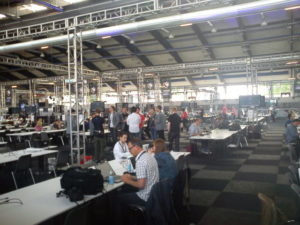
Fans and press as well as participants have now left this year’s host city, Düsseldorf and it is time to shortly look back at the previous two weeks. For many the conclusion is ready; this was the worst organised Eurovision Song Contest in years.
First I would like to give my hands up to the very open press centre with plenty of space in between the tables. This created an atmosphere where the participants felt like engaging with fans and press by walking around and from time to time give a little improvised performance on the spot. That we haven’t seen since 2003 where the contest was held in Riga, Latvia. It has been missed and we were all glad that the German’s brought that back.
They also deserve credit for the catering. The food might not always have been good, but it was in a separate large tent outside the press centre. It offered the possibility of having a proper break where you sit down and eat away from your work. In the press centre a lounge area with free coffee and tea was available… this was used a lot by the many journalists, but water was missing. On these hot days a cold water stand would have been appriciated as well.
The third thing on the plus side was the fact that once you had been through security in the morning you didn’t have to go through it again and could walk from the press centre to the arena without having to scan your bags again. Absolutely something that saved a lot of time.
Three positive things the German’s did well, but they quickly got overlooked as the problems occurred.
The German’s are known for being on time, but it didn’t take more than a day or two before we realised that the “Ordnung Muss Sein” label we all had attached to them wasn’t deserved. It is common that things, doing a day of rehearsals, get delayed due to technical problems with a song or two that then gets extra rehearsal time. In Germany however we experienced that they were delayed already from the beginning almost every day. We never got any explanation regarding the many delays and it appeared like the German’s thought it was completely normal. Those who have been going in previous year’s know that it is absolutely not normal.
Just as we had gotten use to it all starting half an hour later they managed one day to start on time leaving it completely impossible to count on anything. Each rehearsal starts with sound check and a vocal rehearsal and is being shown on the TV screens in the press centre as well, but going to the arena as they started was not an option either as it happen several times that the first rehearsal of a day for some reason wasn’t shown on TV.
The many delays frustrated most of the press present and near the end things just got out of hand and went terribly wrong. The dress rehearsals for the live shows were a nightmare to most. For the first one we were standing outside for an hour in the queue in order to get a good seat. Once we were let in we had to take part in a 100 metre sprint if we wanted to keep the place we had in the queue. Believe me, several found out that running with heavy equipment is not to be repeated and those with big cameras were easily overtaken by the ones without. Once we finally made our destination we had to stand up on very little space for the entire show where we constantly had to fight with other journalist in order to do our job.
That also was the case for last year in Oslo, but only for the first one as then they fixed things and even gave press access to one more dress rehearsal to make up for it. The German’s were stubborn however and did not want to compensate – and worst was that they didn’t make it better for the second or third one. They did make changes as five journalists got injured during the run for the second one though, but unfortunately they changed it to the worse and started forcing the press around as kettles.
Does anyone remember Love Parade 2010 in Germany where 19 people got killed? One would have thought that they had learned from that, but this year’s Eurovision Song Contest showed that they hadn’t. It is very bad that journalists and photographers get injured while covering such an event, but it is considered a miracle that it appears like no one actually got killed.
Those journalists who had rightfully decided not to risk their lives and instead were to cover the first dress rehearsal for the final from the press centre also got themselves an experience in German’s not being so focussed on safety. Suddenly the fire alarm went off and when journalists stood up to see what was going on and being ready to follow instructions the volunteers in the press centre did nothing. It turned out that they had not been instructed on what to do in case of a fire! In this case it was later explained that the alarm had started as one had been smoking at the toilet, but it is simply not acceptable that no one was instructed on how to evacuate people had it been an actual fire.
Never before have we experienced that covering a Eurovision Song Contest can be a matter of life and death – and we hope that it will never happen again. We all thought that Germany would be fully capable of organising Europe’s largest TV event, but they failed miserable in doing so. As some suggested then the German’s might have been too stubborn to even look at how other countries have been doing so and to follow the advice given by EBU. They wanted to do things their own way; a way that turned out wrong.
The show might have turned out quite good on TV, aside from the commentator problems during the first semi-final, but for us press the conclusion is clear: This was the worst organised Eurovision Song Contest in many years.
We hope that Azerbaijan will take some of the good things from this year and improve on the negative ones – and first of all acknowledge that they might not have a lot of experience with big international events like this and therefore ask for advice and assistance from abroad.



















